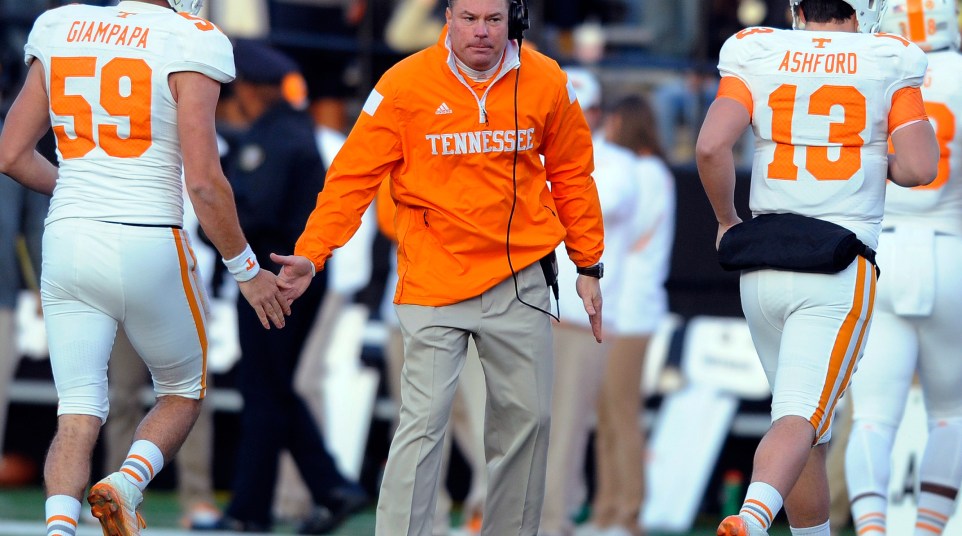Why Tennessee will give up half as many sacks in 2015
Last season it was difficult to argue any offensive line in the SEC was worse than Tennessee’s. After all, the Vols allowed more sacks and tackles for loss than any other team in the conference, and they suffered injury troubles and a lack of depth throughout the year that limited improvement along the line.
However, there are plenty of reasons to believe Tennessee’s offensive line play will be better in 2015 than it was in 2014. Here are the three biggest reasons for that expected improvement:
1. JOSHUA DOBBS
When Dobbs took over at quarterback in late October of last season, Tennessee’s rates of sacks and tackles for loss allowed dropped dramatically. This is due in large part to Dobbs’ mobility and ability to escape pressure, as opposed to the line’s ability to prevent pressure in the first place. Nevertheless, Dobbs rolled out frequently, moved pockets, eluded rushers and made wise decisions with the football that ultimately improved the play of the entire offense, especially the line.
He’ll be back under center for his first full season as a starter in 2015, and once again the line stands to benefit. The unit is somewhat improved (we’ll discuss those personnel improvements below), but it won’t be considered among the better lines in the SEC. Still, Dobbs’ mobility and intelligence in the backfield will help limit the number of tackles behind the line allowed by the UT offensive line.
Even if the line play is no better than last year, it’ll still allow fewer sacks than 2014. Had Dobbs started every game last season as opposed to immobile quarterback Justin Worley, the Vols’ 43 sacks allowed may have sat closer to 30 at season’s end. That’s how big a difference Dobbs makes to the entire offense, and we’ll see that this fall as UT pursues an SEC East title.
2. MIKE DEBORD
It’s been a little while since DeBord worked in college football (since 2007), but the man has a wealth of experience calling plays and coaching offensive lines at both the college and NFL levels. This is no knock on Mike Bajakian, Tennessee’s previous offensive coordinator, but DeBord may actually be a better fit for the job. Bajakian is a tremendous coordinator, but he was very dependent on screen passes that UT’s offensive line failed to run effectively much of the time. Debord, on the other hand, is known for developing linemen, which is exactly what UT’s offense needs to reach a new gear.
DeBord will be blessed with not one but two star tailbacks in Jalen Hurd and Alvin Kamara, and upon factoring in Dobbs’ mobility he’ll find plenty of creative yet simple ways to move the football without asking too much of the line. Of course, the goal will ultimately be to develop the line into a versatile unit capable of handling any play call in any situation, but for the time being Debord will not only develop his linemen properly, but he’ll keep them from being exposed in the meantime.
That last part is critical. There will be some trial by fire on the line this fall as DeBord aims to fill out the unit, but he’s certainly not going to throw everything at his linemen at once and expect it to stick. It’s a process, a process DeBord is familiar with and has used in the past. Tennessee’s line won’t just be better this year, but it’ll show improvement week to week throughout the season, thanks in large part to its new coordinator.
3. RECRUITING
Butch Jones has been a recruiting wiz since arriving in Knoxville prior to National Signing Day in 2013. This past recruiting cycle was no exception, as Jones addressed an area of need along the line by signing five offensive linemen among his 30 total signees, including a pair of four-star tackles in Drew Richmond and Jack Jones.
Essentially, he’s giving DeBord plenty of fun toys to play with as he aims to mold the line into a respectable unit relative to the rest of the SEC. These incoming freshmen won’t star right away, but they have the raw talent to be developed into stars if they put in the work with DeBord. Tennessee returns its entire starting line from last year, so not one single signee will have to play this season, which again allows DeBord to be patient in developing the line.
And as for depth, Tennessee will now have margin for error up front if someone is hurt during a game or struggles in the first few games of the season. Returning the entire starting line is nice, except that line also led the SEC in sacks allowed. Whichever linemen DeBord considers to be the weak links, he can insert a four-star talent in his place and develop that kid from his first day of college ball. That’s quite a luxury.
So a more mobile quarterback, better coaching and a talent infusion through recruiting will all lead to improvements up front for Tennessee this fall.
Will the Volunteers produce a top-5 line in the SEC? Probably not, at least not in Debord’s first year on the job. But are they on the right path to reach that top-5 status in a year or two? Absolutely.

